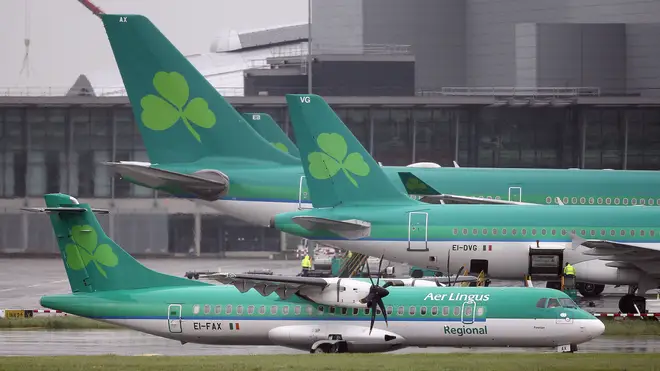
Simon Marks 4pm - 7pm
15 June 2021, 20:53 | Updated: 15 June 2021, 21:41

People arriving in Ireland from Britain will have to quarantine for a minimum of five days, the Irish Government has confirmed.
Fully vaccinated people will have to self-isolate for five days and unvaccinated people for 10, as well as produce PCR tests, over concerns around the Delta variant.
"The broader picture is that the variant has increased in prevalence in the UK,” said Irish Taoiseach Micheál Martin.
"I think it makes sense that we continue to monitor this, which we will take public health advice as we move along, but so far the reopening has gone well in Ireland."

Theater owner explains impact of delay to unlocking
Unvaccinated people arriving from Britain will also need to produce a negative PCR test on day five and day 10 of self-isolation before they are allowed to exit the quarantine period - if they do not they must quarantine for 14 days.
Vaccinated people can reduce their quarantine to five days if they can produce a negative PCR test at that point.
The Irish Department of Health said that the legal requirement to self-isolate will also apply to people arriving in Northern Ireland from Britain, who then travel on to the Republic.
Prior to the announcement, travellers from Britain were requested to quarantine at home for 14 days, but could end their isolation early with a single negative PCR test on day five.
As a result the new rules will translate to longer quarantine for unvaccinated travellers, even if they provide a negative PCR test.
Read more: Agnes Akom: Human remains found in search for missing woman
Read more: More than 30m people in UK now fully vaccinated against Covid
Earlier Higher Education Minister Simon Harris called for a review of the requirement for fully vaccinated people to undergo self-isolation.
The minister said it would be "prudent and sensible" if public health officials examined the advice around self-isolating for those who have been fully vaccinated.
Mr Harris said: "It's my view that there seems to be a logic that if somebody is fully vaccinated, surely they should have some benefit or bonus from someone who's not fully vaccinated?
"So I would like to see a review of the issue of a fully-vaccinated person having to self-isolate or self-quarantine at home. It seems to me not the most logical scenario.
"I would hope that as we move towards trying to reopen international travel and connectivity in the coming weeks, that our medical experts would look again at the issue of how fully-vaccinated people are treated."
Read more: One in five people in parts of EU paid bribes for healthcare during pandemic - survey
Read more: Ex-Royal Marines jailed for using lego boxes to import £1.8m of cocaine
He added: "We must be near to the point that when someone who is fully vaccinated against Covid-19 that there has to be a benefit to that in terms of the isolation rules.
"I made a similar point around mandatory quarantine that if you're fully vaccinated, why are we sending people to mandatory hotel quarantine?
"I'm now asking the question as we learn more about the vaccine, the benefit of the vaccine, is it now time to begin to review the rules around fully vaccinated people having to self-isolate?"
The new rules come into effect immediately.

Venue director lists 'conflicting detail' in Government's Covid advice
Tuesday brought an additional 283 confirmed cases of Covid-19 in Ireland, the Department of Health said.
There were 60 people in hospitals with the disease, of whom 23 are in intensive care units.
Daily case numbers may change due to future data review, validation and update, owing to the cyberattack on the HSE.
Read more: Metropolitan Police accused of 'institutional corruption' in Daniel Morgan case
Read more: Thumbs up: Christian Eriksen posts selfie from hospital bed and says he feels 'fine'
The announcement comes as Prime Minister Boris Johnson was forced to delay the lifting of coronavirus restrictions in the UK by four weeks until 19 July, as the Delta variant became the dominant strain in the country.
Mr Johnson said the delay would allow more adults to receive both doses of the coronavirus vaccine, which Public Health England has said offers strong protection against hospitalisation from the strain.